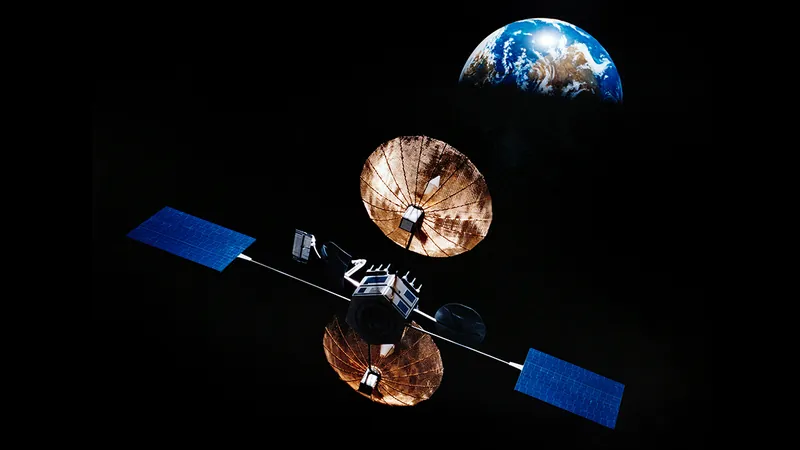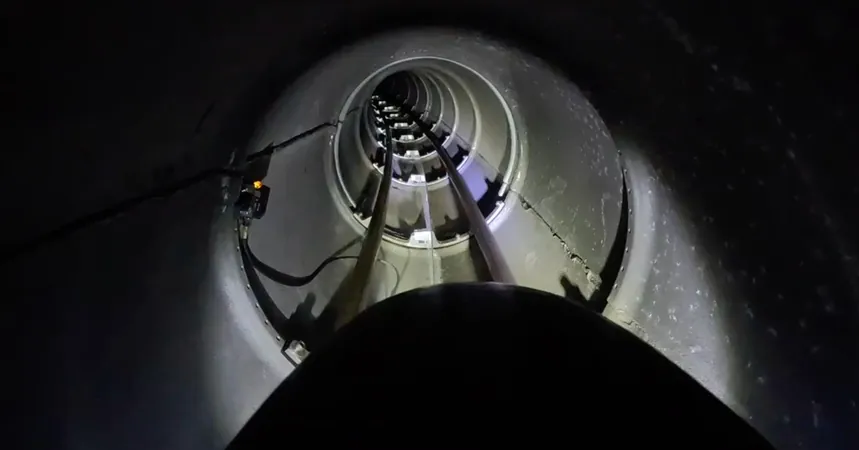
NASA's Next Big Move: Supporting Vital Research in Tropical Forests and Arid Lands
2024-11-01
Author: Jia
In an exciting development for the scientific community, two prominent climate research projects are competing for a substantial funding opportunity from NASA, with the potential to unlock vital insights into tropical forests and dryland ecosystems.
The deadline for feedback on the proposals is fast approaching, with scientists given until November 5 to weigh in. Next year, NASA will announce their decision on which project, or elements of both, will be launched and funded for an ambitious six to nine-year research initiative.
Atmospheric scientist Paul Palmer from the University of Edinburgh applauds both proposals, calling them “fantastic” and emphasizing their complementary nature, which makes the selection process particularly challenging.
Understanding Earth's Ecosystems
NASA's terrestrial ecology program is dedicated to understanding the interaction of Earth's ecosystems with the atmosphere and hydrosphere, addressing critical questions integral to the planet's biogeochemical cycles. The current campaign, known as the Arctic Boreal Vulnerability Experiment (ABoVE), boasts a budget exceeding $100 million and has contributions from over 1,000 scientists, marking it as one of NASA's most extensive field campaigns.
Environmental scientist Elsa Ordway from UCLA leads the tropical-focused proposal, named the PAN Tropical Investigation of Biogeochemistry and Ecological Adaptation (PANGEA). According to Ordway, a budget on par with or exceeding the current campaign is essential to adequately explore pivotal climate change questions.
The Importance of Tropical Forests
Tropical forests are crucial players in the global ecosystem, housing over 40% of the planet's biomass. However, their health is under threat, with potential consequences for the global carbon budget, biodiversity, and the communities that thrive in these environments. Ordway highlights the existing gaps in data regarding the greenhouse gas emissions and absorptions in African tropical regions, which are critical for developing effective climate strategies.
The PANGEA team aims to utilize cutting-edge technology, including satellites and ground-based instruments, to analyze the carbon storage capacity of tropical forests in both Africa and the Americas. Previous studies suggest that these regions respond differently to environmental stresses, and a comprehensive understanding is necessary to avoid tipping points where they might become carbon emitters.
In addition to research, PANGEA has a strong educational component, aspiring to nurture a new generation of African scientists. "There's immense talent and potential on that continent," Ordway notes.
Reimagining Drylands
On the other hand, biogeochemist Sasha Reed from the U.S. Geological Survey leads the Dryland-focused proposal, Adaptation and Response in Drylands (ARID). Contrary to common misconceptions, drylands are home to a significant portion of the global population and are vital for food production and soil carbon storage.
Reed emphasizes the urgency of addressing the unique challenges faced by drylands, which are often overlooked in climate modeling due to their variability and sensitivity to precipitation changes. The ARID project aims to explore these ecosystems' structural and functional responses to climate change, comparing drylands across various countries, including the U.S., Australia, and several regions in Africa and South America.
Community involvement is a cornerstone of the ARID proposal, with contributions from various stakeholders, including indigenous tribes and land management agencies, to ensure local insights are incorporated into the research.
The Significance of a Single Project
Should NASA decide to fund one of the two proposals, the selected research community could see a substantial boost, not just in financial backing but also in collaborative opportunities that foster interdisciplinary approaches vital for climate research.
However, both Ordway and Reed stress the urgency of recognizing the importance of both projects. "Time is running out, frankly," Ordway warns, as climate change accelerates and threatens these critical ecosystems.
Even if funded, both teams plan to seek additional grants to continue their essential work, fostering momentum in their respective fields. Early-career scientists stand to gain significantly from this opportunity, as participation in these projects can shape their careers through mentorship and networking.
In a world grappling with climate challenges, the outcomes of this funding decision promise to be transformative, offering hope for innovative research in tackling the complex questions that define our planet's future.
**Stay tuned as NASA reveals its decision, and remember: The future of our ecosystems hangs in the balance!**






 Brasil (PT)
Brasil (PT)
 Canada (EN)
Canada (EN)
 Chile (ES)
Chile (ES)
 España (ES)
España (ES)
 France (FR)
France (FR)
 Hong Kong (EN)
Hong Kong (EN)
 Italia (IT)
Italia (IT)
 日本 (JA)
日本 (JA)
 Magyarország (HU)
Magyarország (HU)
 Norge (NO)
Norge (NO)
 Polska (PL)
Polska (PL)
 Schweiz (DE)
Schweiz (DE)
 Singapore (EN)
Singapore (EN)
 Sverige (SV)
Sverige (SV)
 Suomi (FI)
Suomi (FI)
 Türkiye (TR)
Türkiye (TR)